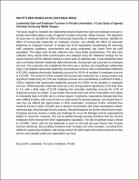| dc.description.abstract | MUYETI BEN WABULAKHA (2010-M102-40019)
Leadership Style and Employee Turnover in Private Universities: A Case Study of Uganda Christian University Mbale Campus
The study sought to establish the relationship between leadership style and employee turnover in private universities taking a case of Uganda Christian University, Mbale Campus. The objectives of study were to; identify the effect of democratic leadership on employee turnover, identify the effect of bureaucratic leadership on employee turnover, and identify the effect of autocratic leadership on employee turnover. A sample size of 65 respondents incorporating all university staff categories (academic, administrative and group employees) was drawn from the staff population. The major tools of data collection were close-ended questionnaires. The data were collected using closed-ended questionnaires and analysed using the Statistical Package for the Social Sciences (SPSS) software basing on Likert scale of collected data. It was established there was a correlation between leadership styles (democratic, bureaucratic and autocratic) to employee turnover. The researcher also established that there was a positive and insignificant relationship (Sig 0.119) between democratic leadership and employee turnover with a standardised coefficient of (0.295), implying democratic leadership accounts for 29.5% of variation in employee turnover at UCUMC. The research further revealed that bureaucratic leadership has a strong positive and significant relationship of 0.728 over employee turnover and a standardised co-efficient of Beta (-0.063), implying that bureaucratic leadership accounts for 0.55% of the variation in employee turnover. While autocratic leadership style has a very strong positive significance of (0.824) close to 1.0, with a Beta value of (0.28) implying that autocratic leadership accounts for 3.2% of employee turnover at UCMC. It was further discovered that most of the respondents were likely to voluntarily leave UCUMC due to various reasons. Voluntarily, respondents indicated that they were willing to leave, with most of them on a job search for greener pastures, and would leave in case they are offered job opportunities in other universities. Employees further indicated they would be forced to leave UCUMC due to absence of promotion and career development within, retirement age, and prolonged chronic sickness. Recommendations for further research were made. Employee turnover remains a reality and challenge for every HR Manager and for organisational leaders to overcome. However, this can be tackled through proving incentives that can prevent employees from moving from their organisations voluntarily. The rate of turnover poses a threat to UCUMC, which calls for the leadership to work on the pull and push factors that increase turnover decisively. By providing incentives both monetary and none monetary, recruiting from within for supervisory positions, and having concern for both output and human resources as they are the most valuable assets any organisation can have.
Key words: Leadership, Turnover, Employee, Private | en_US |


